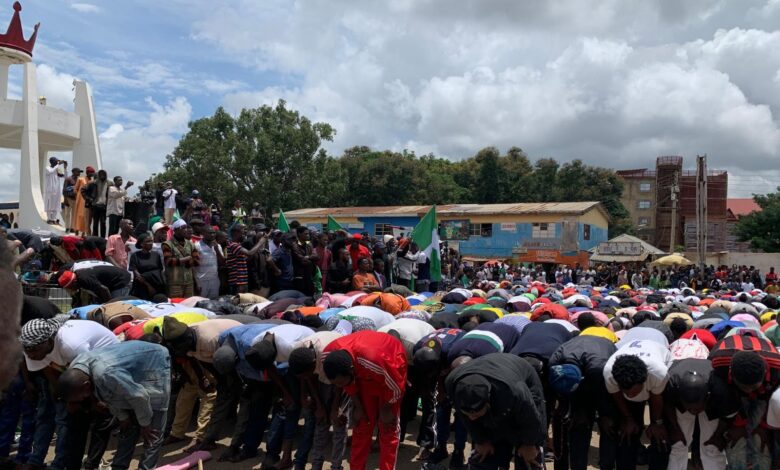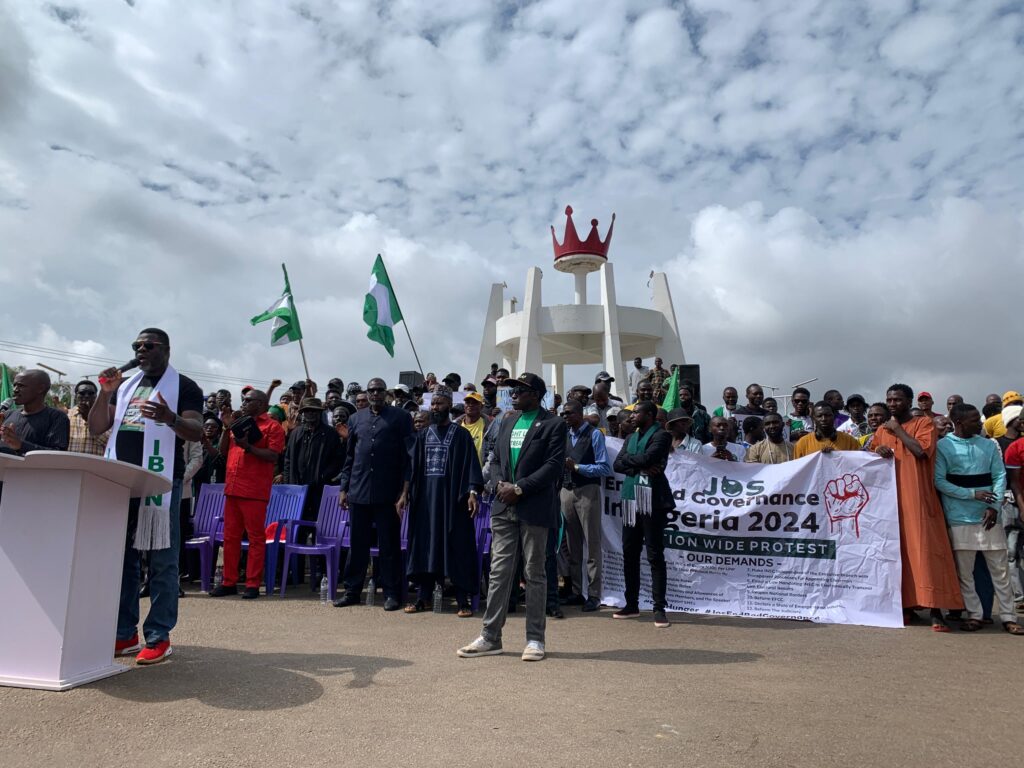‘One Love’: Plateau State Sees Inspiring Interfaith Solidarity During Protests
The #EndBadGovernance demonstration in the northcentral Nigerian state saw Muslims and Christians united, symbolising hope in a city marred by ethno-religious conflict.

Hundreds of residents in Jos, North-central Nigeria, gathered at the Old Airport Junction last Thursday to join the nationwide #EndBadGovernance protests. The demonstration, driven by frustrations over poor governance and the escalating cost of living, witnessed an extraordinary scene: Muslims among the crowd paused to observe their afternoon prayers while Christians respectfully stood by. This powerful image quickly went viral, starkly contrasting with the city’s history of ethno-religious conflict.
Plateau, once celebrated as Nigeria’s “Home of Peace and Tourism,” has been scarred by violent clashes, mainly between Christians (mostly indigenes) and Muslims (who are mostly “settlers”). A bleak chapter began in September 2001 when locals in the state capital fiercely opposed the appointment of Mukhtar Muhammad, a “settler”, as the poverty eradication coordinator for Jos North Local Government Area (LGA). Human Rights Watch reported that the situation escalated after the circulation of anonymous leaflets claiming that Sharia law would be extended to the state.
These riots caused immense suffering, claiming thousands of lives, displacing countless people, and destroying property on a massive scale. Similar incidents had occurred at least three times in the late 1990s, one of which was triggered by the appointment of a Muslim as the sole administrator of Jos North LGA.
Since then, the conflict has persisted, worsened by cycles of revenge attacks. For instance, in August 2021, hoodlums on Rukuba Road in Jos North attacked and killed 26 travellers returning from an Islamic religious event. Locals believe the attack was retaliation for the killings of indigenous people by herders in the Miango District of Bassa LGA, near Jos North. This attack sparked riots across the Jos/Bukuru metropolis, leading to a curfew to quell the violence.
Between 1994 and 2021, the Plateau Peace Building Agency recorded at least twelve outbreaks of ethno-religious violence within the metropolis, resulting in numerous casualties. Despite attempts to rebuild trust, mutual suspicion lingers. Residents of the metropolis typically live and visit communities dominated by their religion and ethnicity.
“People tend to feel safe when it is their kind who’s their neighbour,” said Salis Abdulsalam, founder of Face of Peace Global, a non-governmental peace advocacy organisation.
Yet, the recent protests have offered a glimmer of hope.

“The protest in Jos is not just to end bad governance but to promote unity,” said Solomon Dalung, Nigeria’s former minister of youth and sports, as protesters chanted Bob Marley’s One Love.
Sheikh Suleiman Khalid, a Muslim leader, echoed this sentiment of unity during an inter-denominational Christian service on Sunday, Aug. 4, at the protest ground. “Jos has been known for crisis, but since this protest started, we have all united,” he declared to a cheering crowd. “Peace has come to stay in Plateau state.”
“That’s the spirit of a new Nigeria,” declared Isa El-Buba, a Christian cleric and key figure in the #EndBadGovernance protest in Jos, in an interview with HumAngle. “Here, you see Muslims and Christians united, sitting together, praying together, and sharing meals together – a powerful testament to our collective desire for change and our capacity for unity in diversity.”
The image of united worshipers has become a symbol of potential reconciliation. As local commentator Lengdung Tungchamma observed, “Iconic photos and moments are the substance that builds stories and memories.”
Responding to the inter-faith moments at the #EndBadGovernance demonstrations, one protester, a Muslim, admitted that politicians have long exploited religious divisions. “But now, we know better!” he exclaimed.
“This is a big deal, especially if you have lived in Jos for years. This has never happened before,” said Victor Bello, the founder of Almajiri Scholar Scheme, a Christian-led organisation providing basic education to itinerant children in Jos North. “I think the government and religious leaders should leverage this development to ensure it continues and ends the misconception of religious crises in Jos.”
Seyilnen Bala, a social activist who had been at the protest since the first day, described the development as a breath of fresh air that shows the importance of unity. “Peace cannot thrive when we are intolerant of each other,” he added.
In February 2019, Pope Francis and Ahmad Al-Tayyeb, the Grand Imam of Al-Azhar, signed the Abu Dhabi Declaration, advocating for mutual respect and fraternity among all humans. “The document invites all persons who have faith in God and faith in human fraternity to unite and work together,” it reads in part.
Echoing the sentiments of these global religious leaders, many residents and outsiders hope that the moments at the protest will help address the root causes of conflict in Plateau. “By continuing to prioritise peaceful engagement and dialogue, Plateau state can solidify its position as a beacon of hope for a more just and equitable society,” said Musa Ashoms, the state’s commissioner of information and communication.
Support Our Journalism
There are millions of ordinary people affected by conflict in Africa whose stories are missing in the mainstream media. HumAngle is determined to tell those challenging and under-reported stories, hoping that the people impacted by these conflicts will find the safety and security they deserve.
To ensure that we continue to provide public service coverage, we have a small favour to ask you. We want you to be part of our journalistic endeavour by contributing a token to us.
Your donation will further promote a robust, free, and independent media.
Donate HereStay Closer To The Stories That Matter




